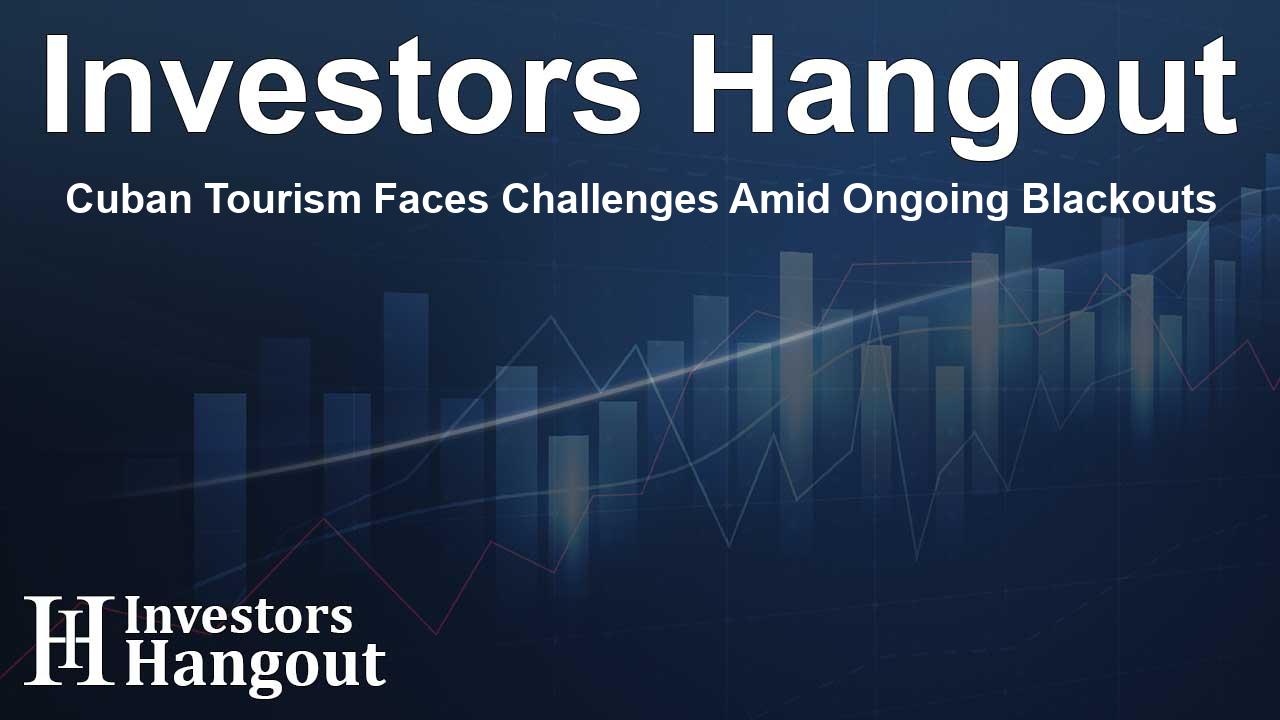Cuban Tourism Faces Challenges Amid Ongoing Blackouts

Cuban Tourism Under Pressure from Ongoing Challenges
As Cuba navigates a complex landscape marked by critical shortages and blackouts, the attraction of this Caribbean island is facing substantial challenges. Visitors, both potential and current, are becoming wary due to increasingly common issues that affect daily life and the overall experience of traveling to Cuba.
Declining Visitor Numbers Reflecting Struggles
Statistics shared by the Cuban government illustrate a troubling trend. Tourism Minister Juan Carlos Garcia reported that Cuba has received approximately 2.2 million international tourists this year. This figure falls significantly short of the initial goal of reaching 3.2 million visitors and is less than half of the numbers seen before the pandemic struck.
This downturn in tourism has interrupted what seemed to be a budding recovery following the COVID-19 pandemic. According to tourism expert Paolo Spadoni, reversing this negative trajectory may prove difficult. He expressed concern, stating, "Unfortunately, Cuba is becoming every day more unique for all the wrong reasons, and thus less attractive as a tourist destination." With a gloomy outlook for 2025, the future appears daunting.
Cuba's Unique Appeal Losing Its Allure
The allure of Cuba has historically drawn tourists intrigued by its unique appeal—a Communist-run island seemingly stuck in time, characterized by classic 1950s cars and a lack of modern commercial development that is commonplace elsewhere in the Caribbean.
However, as taxi driver David Sarzo noted, the ongoing crisis has left many in the tourism industry feeling hopeless. He commented, "We cannot see any light at the end of the tunnel because of the crisis, which leads agents to direct clients away from Cuba."
Impact of Blackouts on the Travel Experience
The picturesque capital of Havana, with its historic El Morro castle and traditional tobacco farming on the outskirts, has been overshadowed by the harsh realities of recent events. Multiple nationwide blackouts have reverberated through all aspects of life on the island, including tourism. Although some larger hotels have backup generators, many budget lodgings and rental homes lack this crucial support, leaving guests without air conditioning in the sweltering tropical climate.
After the recent failure of the electrical grid, the tourism ministry made an effort to reassure prospective visitors, claiming, "We are prepared to face the current challenges and ensure that tourism activities are developed normally." However, negative news about infrastructure issues continues to circulate.
International Response and Travel Warnings
Countries such as Canada, which is a major source of tourists for Cuba, have begun warning their citizens to exercise heightened caution. Alerts have been issued regarding shortages of essential items such as food, medicine, and fuel. Similarly, Germany has encouraged travelers to carefully reconsider their need to visit the island amidst these pressing concerns.
Travel Agency Actions Indicate Growing Concerns
Various businesses are reacting to the challenges facing Cuba's tourism industry. Canadian travel agency Sunwing has removed 26 hotels from its offerings in the country, citing a growing sense of volatility that may unsettle potential travelers. Furthermore, Condor Airline, which has served Cuba for many years, recently announced plans to discontinue its flights to the island, indicating a preference for destinations that promise greater demand.
Visitor Experiences During the Decline
The experiences of tourists who have recently visited Cuba highlight the impact of these ongoing issues. Canadian tourist Kyle Cong shared that his visit last December revealed a more vibrant tourism scene, yet his observations this year reflected a stark contrast with noticeably fewer tourists. He linked this downturn to widespread concerns fueled by reports of blackouts, noting, "People get concerned." As Cuba strives to rejuvenate its vital tourism sector, the need for improvements in conditions and infrastructure remains urgent.
Frequently Asked Questions
What factors are currently affecting Cuba's tourism?
Key factors include ongoing blackouts, shortages of basic necessities, and a significant decline in visitor numbers, which collectively undermine the tourist experience.
How many tourists has Cuba seen this year?
This year, Cuba has received around 2.2 million international visitors, which is well below its target of 3.2 million.
Why are countries warning their citizens about traveling to Cuba?
Countries like Canada and Germany have issued travel warnings due to shortages of food, fuel, and medicine, urging travelers to reconsider their trips.
What methods are being taken to reassure tourists about visiting Cuba?
The Cuban tourism ministry has publicly stated their preparedness to address challenges and maintain normal tourism activity despite ongoing issues.
How has the airline industry responded to the situation in Cuba?
Some airlines, like Condor, have announced plans to halt flights to Cuba, reflecting a shift towards destinations with higher demand due to the current challenges.
About The Author
Contact Addison Perry privately here. Or send an email with ATTN: Addison Perry as the subject to contact@investorshangout.com.
About Investors Hangout
Investors Hangout is a leading online stock forum for financial discussion and learning, offering a wide range of free tools and resources. It draws in traders of all levels, who exchange market knowledge, investigate trading tactics, and keep an eye on industry developments in real time. Featuring financial articles, stock message boards, quotes, charts, company profiles, and live news updates. Through cooperative learning and a wealth of informational resources, it helps users from novices creating their first portfolios to experts honing their techniques. Join Investors Hangout today: https://investorshangout.com/
The content of this article is based on factual, publicly available information and does not represent legal, financial, or investment advice. Investors Hangout does not offer financial advice, and the author is not a licensed financial advisor. Consult a qualified advisor before making any financial or investment decisions based on this article. This article should not be considered advice to purchase, sell, or hold any securities or other investments. If any of the material provided here is inaccurate, please contact us for corrections.
